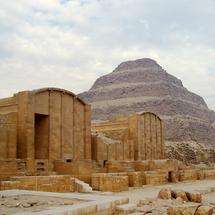Radiocarbon dating pinpoints chronology of Egyptian kings

(PhysOrg.com) -- An international research team has mapped out an accurate chronology of the kings of ancient Egypt using a radiocarbon analysis of short-lived plant remains from the region.
An international research team has mapped out an accurate chronology of the kings of ancient Egypt using a radiocarbon analysis of short-lived plant remains from the region.
The research sheds light on one of the most important periods of Egyptian history documenting the various rulers of Egypt’s Old, Middle and New Kingdoms. Despite Egypt’s historical significance, in the past the dating of events has been a contentious undertaking with Egyptologists relying on various different chronologies.
The radiocarbon dating, led by Professor Christopher Ramsey from Oxford's Department of Archaeology, provides some resolution on the dates and nails down a chronology that is broadly in line with previous estimates. However, the new dating evidence, published in the journal Science on 18 June, does rule out some chronologies that have been put forward - particularly in the Old Kingdom, which is shown to be older than some scholars thought.
For example, in the Old Kingdom, Djoser, one of the best known pharaohs of the Third Dynasty of Egypt who is thought to have commissioned the first of the pyramids, was found to have ruled from between 2691 and 2625 BCE, about 50-100 years earlier than some experts thought. The study also suggests that the start of the New Kingdom might be pushed back slightly to between 1570 and 1544 BC.
The study has implications for the whole region as the Egyptian chronology anchors the timing of historical events in neighbouring areas tied to the reign of particular Egyptian kings. The research will allow for more historical comparisons to be made in countries like Libya and Sudan, which have conducted radiocarbon dating techniques on places of archaeological interest in the past.
Professor Ramsey and colleagues from the Universities of Oxford and Cranfield in the UK, along with a team of researchers from France, Austria and Israel, radio carbon dated 211 various plants from museum collections from all over the world. They used OxCal, a computer programme (devised by Professor Ramsey) that provides a radiocarbon calibration and analysis of archaeological and environmental chronological data. Oxford student Michael Dee combined the dates for the seeds, baskets, textiles, plant stems and fruit, which were all directly associated with the reigns of particular ancient Egyptian kings, with historical information about the order and length of each ruler to create the full chronology.
The team also undertook research on environmental samples from Oxford University Herbaria and found minor differences in radiocarbon levels in the region - important information for future dating studies.
Professor Christopher Ramsey said: ‘For the first time, radiocarbon dating has become precise enough to constrain the history of ancient Egypt to very specific dates. I think scholars and scientists will be glad to hear that our small team of researchers has independently corroborated a century of scholarship in just three years.
‘My colleague Joanne Rowland went to a lot of museums, explaining what we were doing and asking for their participation. The museums were all very helpful in providing the material we were interested in to ask for their help. We are very grateful to them for providing us with the material we were interested in - especially important since the export of samples from Egypt is currently prohibited. Fortunately, we only needed samples that were about the same size as a grain of wheat.’
Provided by University of Oxford


















